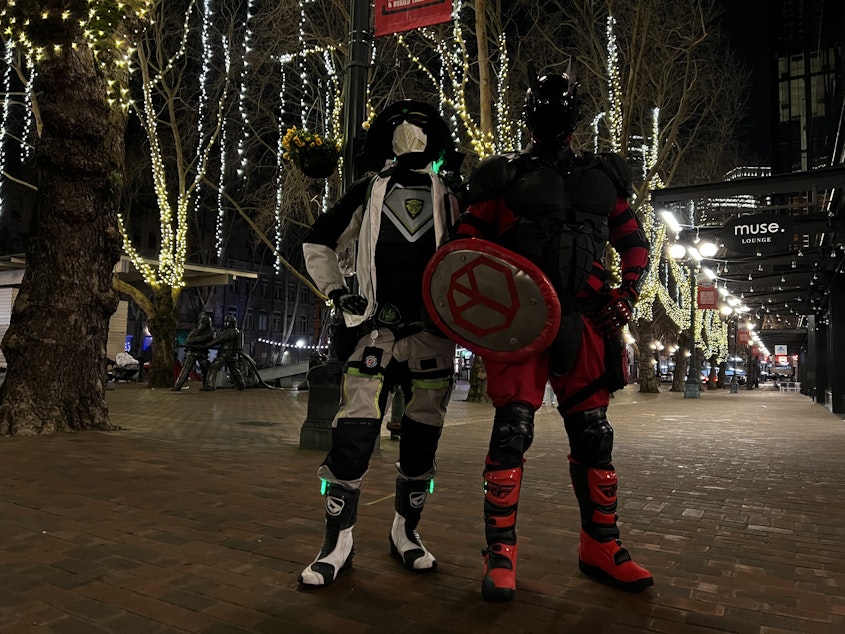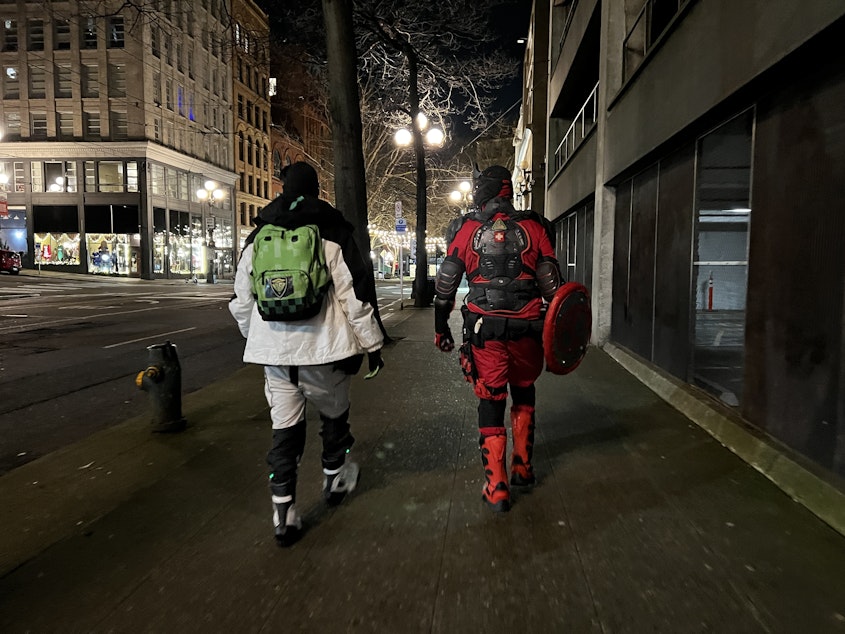A night on patrol with Seattle's 'real-life superheroes'

If you followed Seattle news around 2008, you may remember news clips of so-called "real-life superheroes" patrolling the city's streets.
Although local heroes aren't on the evening news as much these days, a group of volunteer vigilantes are still fighting crime in the dark of the night.
Soundside producer Alec Cowan recently joined two heroes on patrol to hear more about the work local superheroes are doing and why.
At 10 p.m. on a spring Thursday night, at the corner of Pioneer Square's Sinking Ship parking garage, two costumed heroes begin unloading a car.
RELATED: What do our superheroes tell us about ourselves?
One is dressed in a red and black suit of padding and armor, complete with a metal shield on his arm and a black helmet with protruding Batman-style ears. The other hero is dressed in a black and white costume with a plastic facemask, sunglasses, and a hood shrouding his face.
They are the Red Ranger and Justin Service, two of Seattle's "real-life superheroes."
"We're going to be keeping our eyes out for safety, anybody who needs help, medical attention — and do our best to help our community," Red Ranger said as he unloaded dozens of drawstring bags into a nearby caddie.
Sponsored
It's a routine the two heroes have done for years as part of ECHO, the Emerald City Heroes Organization. The group connects a loose band of people looking to do altruistic work in Seattle under the guise of pseudonyms and comic-book-style suits.
That work most commonly takes the form of weekly patrols, like the one Red Ranger and Justin Service are about to embark on. They spend the first half of the night handing out drawstring bags containing food, water, and socks. Then they take a vigilant stroll to ward off crime.
RELATED: From feminism to black power. How superheroes changed the status quo
Reactions from passersby were mixed as they headed out of the garage and walked toward 3rd Avenue. Some did a double-take or pointed at the fully costumed superheroes waiting for the crosswalk. Others stopped for a photo or mentioned they recognized the heroes from TikTok, where short videos recapping their patrols have tallied millions of views.
"There are a lot of people who say what we're doing is ridiculous. I agree," Red Ranger said. "But when you have enough people like the people we've met, who get genuine help and really appreciate what we do ... man, that's payment enough."
Sponsored
Comic book origins
Although the two are cagey about protecting the hidden identities outside their suits, they were both eager to share the stories that took them from everyday pedestrians to costumed vigilantes.
For Red Ranger, that origin story began 10 years ago.
RELATED: Every superhero has an origin story. So does every superhero's superfan. Here's mine.
"When I first started working in the hospitals here in Seattle, I would see so much violence," he said, adding that he's a registered nurse by day. "Patients coming in from violent assaults or gun violence, and I kind of resolved myself to say that as much as I can prevent that from happening, I will."
Sponsored
Emboldened by a sense of justice, he donned his first suit, a red Power Ranger Halloween costume, and took to the streets. He wanted to address what he saw as a lack of outreach in a growing homelessness crisis, alongside the more heroic work of literally fighting crime.
"The first time I ever put that suit on and I looked in the mirror, I was like, 'You're crazy,'" he said. "And I still hear that every time I put this on."
At first, Red Ranger said he didn't want to be personally recognized for the work he was doing, and that's why he felt the need for a suit. Since then, as he's upgraded and personalized the outfit, he said it's helped familiarize the community with ECHO's work — both as a symbol of help and a deterrent against crime.
RELATED: DC Comics’ Poison Ivy is an ecoterrorist — and the anti-hero the Pacific Northwest needs
"We'll admit it's a bit fun to dress like this," he said. "Of course, we do all have 9-to-5s. We do have families that we want to protect. Some of what we do is dangerous, so having some anonymity to buffer our personal lives and our work is definitely helpful."
Sponsored
Originally from a small town in North Idaho, Justin Service was drawn to Seattle by an HBO documentary on the early years of the real-life superhero movement, titled "Superheroes."
"I thought that'd be kind of cool to try out," he said. "Stopped some bar fights here and there, but it didn't really seem like helping people."
Shortly before Justin's arrival, Seattle's "real-life superhero" movement had faced a serious challenge. The local superhero scene had garnered national attention, largely thanks to a boisterous hero named Phoenix Jones; but after repeated run-ins with the law that stressed the limits of their legal vigilantism, dedicated heroes divided into groups like ECHO.
When Justin came across the group on Facebook, he felt they offered more than the occasional scuffle. Their philosophy was more concerned with outreach, the need for which was familiar to him. For a period of time, he was once homeless himself, primarily staying in the same Pioneer Square area he was now patrolling.
Sponsored
"If the system in place worked for everybody, which is an ideal world, then maybe we wouldn't be here," Red Ranger said. "But hopefully, we can get at least people thinking one step closer to that world."

Hero work in Seattle
As the patrol continued, the heroes approached a larger group of people gathering at 3rd Avenue and James Street, across from the entrance to the Pioneer Square light rail station. The heroes handed out their drawstring supply bags and asked if anyone needed medical attention, attentively listening to the group's needs.
RELATED: The SCOTUS case that could change the rules on homelessness
Red Ranger said a lot of their interactions are like this, largely de-escalation efforts and safety checks. But once the caddie is emptied of supply bags, the heroes pivot the rest of their night to walking the streets in search of the heroes' more controversial mission: fighting crime.
"We don't want to have to be physical. Of course in the past, unfortunately, it has happened on patrol," Red Ranger said. "We do find crime, and we do have to fight it. People have tried to assault us or people near us, and we've had to put a stop to it before."
While heroes organize themselves under the banner of ECHO, Red Ranger explained that the rules governing their work are a little loose. Their first prerogative is to help people, which he said comes with an inherent ethos of "putting the work we do above yourself and your ego."
"Our first intervention is always to make friends, not foes, right?" he said. "People think a lot of time, patrol is going out there looking for violence, butts to kick and names to take — but that's not it at all."
RELATED: Libraries in Western Washington confront the challenges of being open to all
Most of the heroes' physical confrontations come after the local bars close or when arguments escalate after a traffic incident. In those situations, the heroes' first choice is to de-escalate. If that fails, and physical altercations ensue, Red Ranger said the heroes have an array of options to turn to, from nonharmful holds and lawful uses of force to a series of tools hooked to their belts.
Even then, their armor — which, according to Red Ranger, is bulletproof — plays an important part in their work.
"We've definitely had guns pulled on us. We've had knives, bats, iron bars," he said. "There have been people who tried to kill me before or people who tried to just hurt me. ... But I know that the work I'm here to do is that important, so a few bruises along the way aren't going to scare me away."
In the past, the confrontational piece of being a real-life superhero has mired the practice in controversy, testing the limits of what a costumed civilian can legally do.
RELATED: In Burien, 'the soap opera continues' as quarrels grow over city's camping ban
For their part, Red Ranger said their interactions with first responders are "normally quite good." But groups across the country have had trouble with heroes actively seeking out physical altercations, emboldened by the anonymity of a costume and mask.
"It appeals to a fantasy element, for sure," said Tea Krulos, a journalist and author of "Heroes in the Night: Inside the Real Life Superhero Movement."
"It's kind of fun to have this secret life, double identity, to create your own hero — and sometimes putting on a mask is very empowering because people can't see who they are," Krulos said. "They're free to be someone that they're not."
In studying superhero groups across the country, Krulos found a familiar mix of intentions behind masked marauders. He said that, by and large, patrols end up being somewhat boring, leading new heroes to drop out after feeling their work isn't having an impact. For others, a misguided sense of justice can land them in trouble.
"Some are definitely a positive force in this world and others are not, and some are kind of in between. They might have a good intention, but they're a little bit delusional about what they're doing," he said. "It also speaks to a mistrust. There's a lot of mistrust in our policing systems and our government in general. So, it's kind of an American tradition."
"People want to take law and justice into their own hands."
Listen to the full Soundside segment on patrol by clicking "play" on the audio icon at the top of this story.





